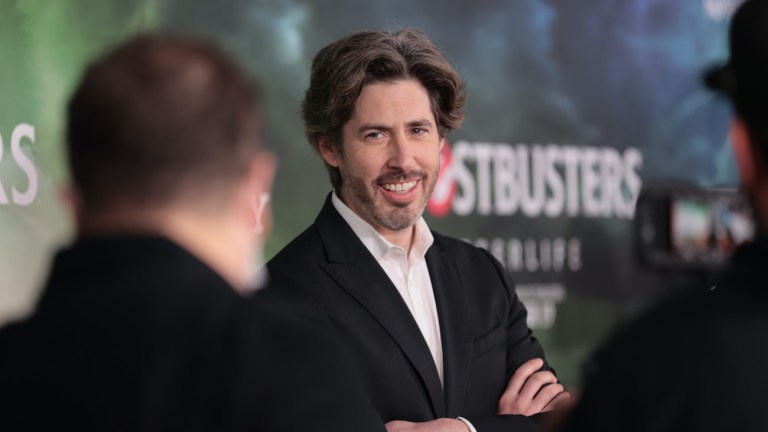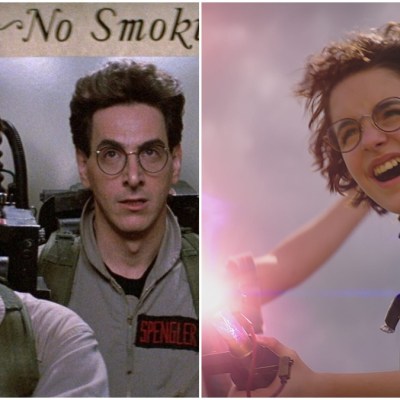Ghostbusters: Afterlife – Jason Reitman Finally Addresses the Biggest Spoilers in the Movie
Ghostbusters: Afterlife is the movie hit of the weekend, and Jason Reitman is ready to talk about (most of) its secrets.

This article contains Ghostbusters: Afterlife spoilers.
According to Jason Reitman, he never wanted to make a Ghostbusters movie. But while most folks likely don’t stress over such things, most folks are also not the son of Ivan Reitman, director of Ghostbusters and Ghostbusters II. And so the conversation of whether he’d ever make a Ghostbusters movie came up at one time or another throughout Jason’s professional life. He heard the question after he found early success in films like Thank You for Smoking (2005), Juno (2007), and Up in the Air (2009), and he heard it again in recent years. So it must have been the funniest thing when one day, the Oscar nominated filmmaker finally realized he did have a story to tell…
A few days after the film’s impressive opening weekend, it seems plenty of people were eager to hear it too. Blowing past all industry projections, Ghostbusters: Afterlife has very much injected new lifeblood into the nearly 40-year-old franchise, and introduced a whole new generation to the concept with a young cast of Ghostbusters which includes Mckenna Grace, Finn Wolfhoard, Logan Kim, and Celeste O’Connor. And yet, if you’ve seen the finished film (which we really hope you have if you’re reading this), then it’s the ending and all the little surprises which harken back to 1984 that has dominated the conversation: the three surviving Ghostbusters played by Bill Murray, Dan Aykroyd, and Ernie Hudson returning for an encore; a post-credits scene that brings back Sigourney Weaver as Dana Barrett; and even the inclusion of a CG-recreation of the late Harold Ramis as a ghostly Egon Spengler.
We discuss all o those elements in the below spoiler-filled interview, as well as why Reitman made the choices he did…
You’ve talked about the first images you had in your head for this movie were of a little girl using a proton pack and a teenage boy driving Ecto-1. When did you realize their stories still needed to end with the original Ghostbusters returning on-screen?
Jason Reitman: I started talking to my writing partner Gill Kenan frequently about these ideas not knowing quite what to do with them. I’ve always been intimidated by the idea of making a Ghostbusters film. The shadow of my father, the shadow of that franchise loomed large—and [the franchise] was always a place I kind of avoided. But this is a story I felt the urge to tell, and when we started breaking down how it might work, very early on did I think it would be wonderful [if this was] a film where we handed audiences back the PKE Meter, the trap, the car, the pack, and eventually the guys.
It would feel like Christmas morning as you opened a gift after a gift, and found yourself back in the film that you loved.
Was there a version of this script where the guys didn’t come back or was that always the impetus?
I would not have been interested in making this film if it did not have the original Ghostbusters.
What were the discussions like with the original actors about suiting up once more?
You know, we didn’t really talk about it. They put the suits back on and they felt very at home in them. They felt so comfortable. I remember Bill saying that ‘you put it on and you just immediately feel like a superhero.’ Which is interesting, because I’ve always thought of Ghostbusters as—not all of us are born looking like Thor, you know Not all of us are born with superpowers, but we can all put on the flightsuit, and I thought that was what was magical about the Ghostbusters.
You’ve talked in the past about growing up on the set of the first movie. What was it like for you now seeing them again in those costumes but now as an adult?
It’s funny because when I was on-set with like McKenna [Grace] and Finn [Wolfhard], I always thought I was making my Ghostbusters film. But as soon as I was on the set with Bill, Ernie, and Dan, I felt like I was a kid again on my Dad’s set.
Dan is always such a well-spring of ideas when it comes to everything Ghostbusters. Did he have any input or ideas he pitched to you?
It was more about language. What I love about talking to Dan Aykroyd is the moment he starts talking, you feel like you’re in the verbiage of Ghostbusters. He has a way that only he speaks. He has read everything, he obviously has deep roots in science fiction and ghost folklore, and when he talks about it, he talks about in just a way that no one else talks. And you immediately just want to scribble everything down and put it in the movie.
Did you put anything he suggested in this movie?
Oh yeah, particularly the dialogue for his character. When he’s talking to Phoebe on the phone and he starts talking about the fuel isotopes and things like that, this is just stuff that only Dan can come up with.
I thought it was a nice touch that you had Winston—who was the hired gun in the first film—become the most successful one while Ray is still working the Occult bookshop. How did you come up with those trajectories for these characters?
I guess we always imagined Dan, Ray Stantz, following his passion, and his passion is the occult, as opposed to Winston who always had a business mind. He came in looking for a steady paycheck, and we imagined him being a huge thriving success. If there was a way we wanted to see him moving forward, it was as more of a Bruce Wayne, Tony Stark type.
Was there any debate amongst yourselves about how much to show a spectral recreation of Egon?
I’m not really going to talk about that yet. I understand the urge to talk about it. I’m not sure I even feel comfortable talking about that yet. I will say that I knew what the ending of the movie was very early. I knew it was going to be very hard to pull off. And I knew that the success of the film depended on one moment that was going to have to depend on technology that was on the bleeding edge. And frankly, it took us the entire length of the making of the movie to accomplish. And I didn’t know whether it was going to be a success until the very end of the process.
What was it like on the day for Ivan or the cast filming that sequence?
… If you were on set that day, you would have seen four very talented actors working together. [Laughs]
To pivot to the end credits sequences, it was great seeing Bill and Sigourney on-screen again. How much of that was improv with Bill?
We had a script for that scene. Apparently the script was unnecessary. [Laughs] … That took half a day. Bill came into the movie with his own ideas, and they were brilliant. And I had grown up hearing the stories of Bill improvising, watching him do it live on-set. It was a thrill to watch him in real-time deliver dialogue that was far superior to anything I could’ve come up with in the couple of years of writing this movie.
His brain crackles in a different way, and his voice is authentically his and has been so since we first met him. So to hear Venkman come to life in his voice again thrilled the crew, thrilled me, thrilled my Dad, and it made me want to get to editing a quickly as possible.
I imagine the problem in that situation is picking which line to keep in.
A hundred percent. On every line of Bill’s, there was an alternate that was just as good.
You’ve said this movie is setting the table for potentially all varieties of Ghostbusters stories. Did you talk with Dan or Ernie or Bill about there being room to lead one of those stories?
No, I just spoke about the idea of there being more and my desire to see more Ghostbusters movies. Every culture has its own relationship with ghosts and I want to see those movies from some of my favorite filmmakers. And [the original cast] are all incredibly proud of this thing they created that lives in the hearts of others. And they seem just as excited as I am about it.
Could you name some filmmakers who would make an amazing Ghostbusters movie?
I mean, there are far more talented directors than me. I’m not trying to be humble here. There’s just brilliant filmmakers out there, particularly ones who made and are making big tentpole movies, but also ones I admire from the indie world, and I’d love to see them all working in this genre.
You look at Marvel and how they’ve assembled this incredible roster of directors to tell their own kinds of personal stories in that universe. I can only imagine the kind of films we could have within the Ghostbusters mythology if those kind of filmmakers came to Sony.
We’ve seen the startup movie, we’ve seen it as a family. Do you think there’s room for Ghostbusters Inc. as a business model?
What I’ll say is the great thrill for me about Marvel is watching Taika make a movie; it’s watching James Gunn make a movie; it’s watching these filmmakers I already admire coming in and telling their version of a Marvel film. I want to see those same filmmakers come in and make Ghostbusters movies.
I want to ask then about your Ghostbusters movie. I think the best elements here are how great Mckenna is, how great the whole younger cast is. Do you have any interest in seeing them on their own adventure away from the first film’s legacy?
Oh my God, I’d love to. I think Finn and Mckenna are already two of the bright stars of their generation, and I think Logan [Kim] and Celeste [O’Connor] will soon join them. They have so much talent, they love these characters, they love Ghostbusters, and they love each other. And that’s kind of obvious, you can tell when actors really dig each other. You’re watching a movie and you go, ‘I think they get along.’ And you can tell with this group that they’re really tight. I would love to watch them continue ghostbusting.
Ghostbusters: Afterlife is now in theaters.

